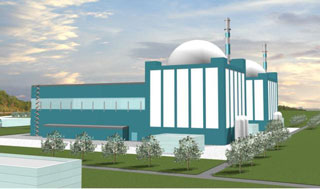Russia pressures Bulgaria on Belene loan
22 February 2010
The Bulgarian finance minister Simeon Dyankov has said that he will not authorise a €2.0 billion ($2.7 billion) state -guaranteed loan from Russia's state nuclear corporation Rosatom towards the financing of constructing the Belene nuclear power plant, following last week's negotiations on the deal between the two governments.
 |
How Belene could look (Image: NEK)
|
However, according to Bulgaria's top nuclear experts, the deal will go forward, but the negotiations on the conditions of the contract between Rosatom's subsidiary AtomStroyExport (ASE) and the Bulgarian government are yet to be finalised.
"Last week the Bulgarian Prime Minister Boyko Borisov, the Bulgarian energy minister, Traicho Traikov and the Russian energy minister Sergey Shmatko, who came to Sofia on a third consecutive visit in the last five months agreed on principle to accept Russia's offer," said Stanislav Georgiev, head of the Bulgarian nuclear agency Bulatom. He added, "In addition, according to Rosatom's head Sergey Kiriyenko, Russia does not demand state guarantees."
The existing agreement between ASE and NEK to build the two 1000 MWe light-water reactors at Belene has already been extended by three months and is set to expire at the end of March. It is expected that these negotiations will be concluded on time.
This is consistent with Borisov's continuous commitment to build Belene, thus safeguarding the best interests of Bulgaria by preventing having to pay penalties on the contract or falling behind on the plant's construction. He has also said that he will configure the project, which includes the open bid for a new adviser on the project.
The outcome of the meeting between the Kiriyenko and Traikov is that Rosatom is prepared to lend €2.0 billion to Bulgaria to continue construction on Belene in exchange for a stake of 30% to 35% in the future plant.
Borisov has already reduced the possible Russian loan from €4.0 billion ($5.4 billion) to €2.0 billion ($2.7 billion), leaving the door open for another international partner.
Following RWE's departure in 2009 as a 49% stakeholder in the Belene project and the departure earlier this year of BNP Paribas, which failed to attract new investors to the project, the reduced Russian offer remains the best on the table.
"The Bulgarian government has a few options, including signing a contract with Rosatom by end of March, also against a future share in electricity production," said Georgiev. "It also can extend the existing contract with AtomStroyExport as it has already done, so it has space to manoeuvre and accept the Russian offer, however the appointment of a new consultant on the project could take longer, but that should not effect the immediate options to finance Belene’s construction," he said.
By Rumyana Vakarelska
for World Nuclear News